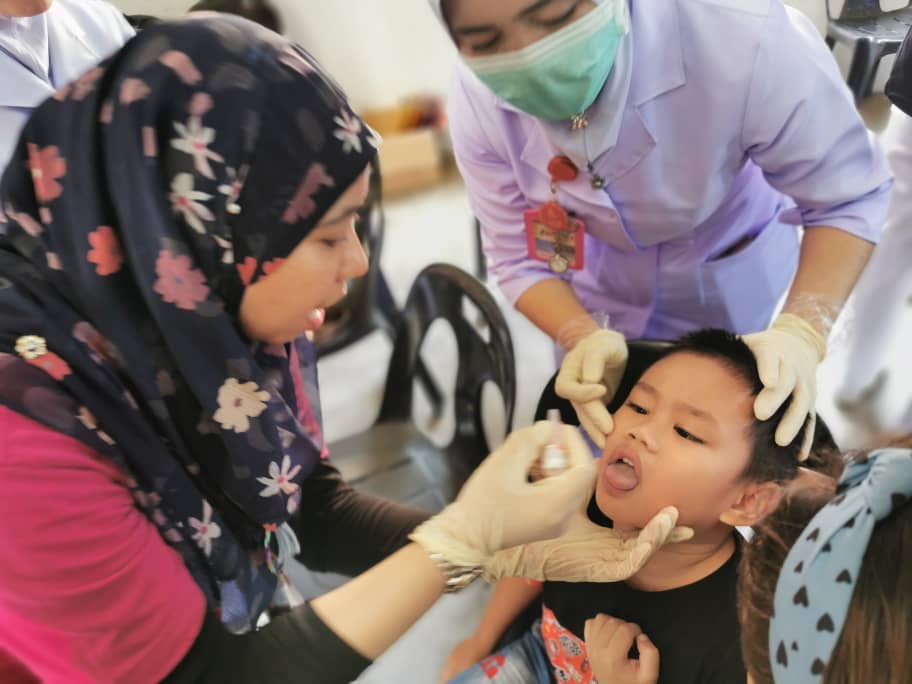KUALA LUMPUR, Nov 11 — About 81 per cent of Sabah children have received two doses of the monovalent oral polio vaccine (mOPV) as of October 21 in a polio vaccination campaign, Dr Adham Baba said.
According to the health minister, the Ministry of Health’s (MOH) Sabah polio immunisation campaign had slowed since the first phase of the Movement Control Order (MCO) implemented nationwide from March 18 amid the Covid-19 epidemic.
The polio vaccination campaign was revived during the Recovery Movement Control Order (RMCO) that started on June 10. But active vaccination activities were halted in areas in Sabah that reported an increase of Covid-19 cases after a recent coronavirus surge hit the state, said Dr Adham.
“Till October 21, 2020 a total of 815,846 (95.6 per cent) of children have received two doses of bivalent oral polio vaccine (bOPV) while 688,016 (80.6 per cent) of children in Sabah have received two doses mOPV vaccine,” Dr Adham said in his written Parliamentary reply on November 3.
MOH’s polio immunisation campaign in Sabah started on December 27 last year when a polio case was detected last December 8 in the state, the first time in the country in 27 years.
“The campaign has been carried out since December 27, involving giving two types of oral polio vaccine — which is the bOPV type one and type three and mOPV type two — that is given in drips into the mouth,” Dr Adham said.
“In this campaign, every child below the age of 13 around the whole state of Sabah will be given the bOPV and mOPV vaccine, with each vaccine given in two doses.”
Sipitang MP Yamani Hafeez had asked the health minister to state the seriousness of polio cases that have been reported of late, especially in Sabah, and if the ministry has adequate numbers of vaccines to be given to the patients. Besides that, Yamani also asked Dr Adham to state how the polio disease re-emerged in Malaysia in 2019, after a long period of being free from the virus.
According to the health minister, after the last case of polio reported 27 years ago, a new polio case was reported in Sabah on December 8. As of now, there are four confirmed polio cases in Sabah, involving a three-month-old baby and children aged three, eight, and eleven.
“The last case reported had symptoms of paralysis on January 18, 2020,” Dr Adham told Yamani.
“Among the four polio cases, one case is still being treated in hospital, needing ventilator support, while three other cases are still experiencing weak legs but are able to walk with support.”
Polio is a disabling and life-threatening disease caused by the polio virus that is very contagious and spreads through person-to-person contact. Most people who get infected with the polio virus will not have any visible symptoms, while about one in four patients have flu-like symptoms, such as sore throat, fever, tiredness, nausea, headache, and stomach pain, and a smaller proportion of people develop more serious symptoms like paresthesia (feeling of pins and needles in the legs), meningitis (infection of the coverings of the brain), and paralysis (weakness of limbs).
Besides that, Dr Adham said through environmental sampling that was conducted, the polio virus was detected in 24 wastewater samples taken in Sabah, as well as in one wastewater sample taken in Labuan.
“The last positive environmental sample detected with the polio virus was on March 13, 2020.”
According to MOH, one of the causes of the polio infection in Sabah was because of the frequent mobilisation among foreigners who frequently cross the borders between the Philippines and Sabah. These immigrants also do not have a immunisation record, which puts them at a higher risk of getting infected with the polio virus.








